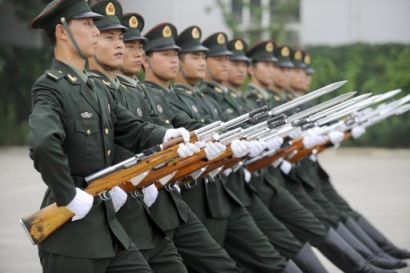IDR Blog
Is China nervous?
India needs to remain wary of China given that country’s behaviour in the last few years, despite the smiles, handshakes and all those diplomatic niceties with noble intentions. There has been little movement on core strategic issues like the boundary as we derived disproportionate satisfaction out of burgeoning bilateral trade with adverse terms of trade for us.
The Chinese keep protesting to us in various ways about our attempts to improve our infrastructure and defence capabilities in Arunachal Pradesh after they themselves have deployed nuclear missiles in the Tibet…
Chinese intrusions across the LAC in Ladakh have become more frequent. These intrusions suggest a pattern and the pattern sends a message. The message goes beyond wanting to keep India on the back foot in Jammu and Kashmir. As the Chinese say, ‘To get rich build roads,’ and the present leadership will spend US $18 billion building tunnels in Gilgit and Baltistan that will connect Xinjiang to the Arabian Sea at Gwadar. This reassures Pakistan of a love sweeter than honey.
The message is also for our other neighbours telling them that China can safeguard its interests in the region and asking them to make their choices about the guarantor of their economic well being and regime stability. Chinese involvement in various infrastructure projects in Sri Lanka, Bangladesh and Myanmar along with resource extraction in Afghanistan is already well documented. The fact of their growing presence in our neighbourhood cannot be ignored by our policy makers.
The Chinese keep protesting to us in various ways about our attempts to improve our infrastructure and defence capabilities in Arunachal Pradesh after they themselves have deployed nuclear missiles in the Tibet region and now have a well developed infrastructure right up to the border. The famous Qinghai-Lhasa railway line new extends up to Xigatse and there are plans to extend this to Nepal.
China exhibits reactions typical of a totalitarian state when it suspects all free thought. It does not take to criticism abroad very lightly. It rapidly becomes hostile and ruthless against protests and dissent at home especially if these are persistent and violent. Any change of location of Indian army formations or their headquarters following Chinese protests would be a tacit admission of their claim and an exhibition of our lack of resolve which sends a negative message about us to our neighbours. India needs firmness of resolve not belligerence to assert national security interests.
China is convenient to believe that the Tibet problem will be ‘solved’ after the present Dalai Lama dies and Beijing will select a convenient successor. However, a very real fear is that the next generation of young Tibetans may not believe in non-violence for solving their problems.
It is conceivable that China is acting more out of bravado and nervousness when it seeks to engage its neighbourhood aggressively from the Sea of Japan to the Himalayan ranges and across the Western Pacific rim as well. The one major reason is the economic slowdown which has affected China as well.
China’s export driven economy slowed down as its clients ran out of the means to buy. This rebounded on its own ability to buy leaving it with excess capacities in vital areas like steel and cement. As China slowed down, relatively speaking from a 10 per cent rate of growth that is now hovering close to 7.5 per cent with difficulty, it sent ripples within the country and across the globe. The IMF assesses that one percentage point decline of the Chinese economy reduces global growth by one tenth of a percentage point.
Economic uncertainty means political uncertainty across the country and that is the chief dread of the leadership. No wonder the recent outbreak of violence in Xinjiang where restive native Uighurs have been campaigning against discrimination by the Hans and the Hanisation of their region. There was renewed violence last month as the Uighurs commemorated the July 2009 killing of more than 200 Uighurs in riots that lasted a few days. The Uighurs are Muslims and their movement is now led by the East Turkestan Islamic Movement with links in Pakistan and Afghanistan. The Chinese are also concerned about uncertainty in Afghanistan and Central Asia after the US/NATO pullout in 2014.
Despite running Tibet with an iron hand, Bejing remains unsure and suspicious of the Tibetans as self immolations continue. It is convenient to believe that the Tibet problem will be ‘solved’ after the present Dalai Lama dies and Beijing will select a convenient successor. However, a very real fear is that the next generation of young Tibetans may not believe in non-violence for solving their problems. Tibet will remain on Beijing’s radar as it grapples with economic issues and political unease, if not unrest.
It is this unease arising from domestic, political and economic considerations at a time of the ascendancy of a new political leadership in Beijing that could contribute to Chinese adventurism and recourse to hyper-nationalism.
Courtesy: www.mid-day.com
Post your Comment
One thought on “Is China nervous?”
 Loading Comments
Loading Comments





sir, if we r capable to stand the chines public against their goverment , bcoz the cause of home war in china will divert china to there policy .